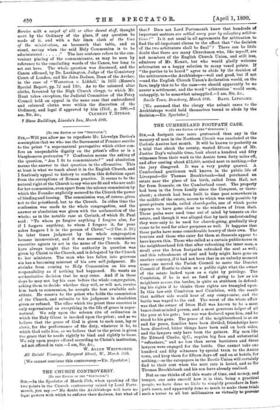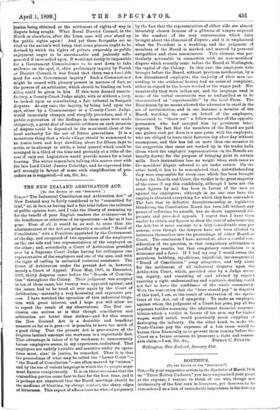THE CUMBERLAND FOOTPATH CASE.
(To THE EDITOR OP THE " SPECTATOR.'] Sin,—A footpath case more protracted than any in the memory of man in the Northern Circuit was concluded at the Carlisle Assizes last month. It will be known to posterity as a trial that shook the county, wasted fifteen days of Mr. Justice Day's valuable time, took about a hundred and fifty witnesses from their work to the Assize town forty miles off, and after costing about £15,000, settled next to nothing,—for the jury disagreed. It was a very pretty quarrel. A Cumberland gentleman well known in the public life of Liverpool—Sir Thomas Brocklebank—had purchased an estate near the place of his birth, called Irton Hall, not far from Seascale, on the Cumberland coast. The property had been in the Irton family since the Conquest, or there- about ; a church had been built in time past somewhere in the middle of the estate, access to which was only possible by quasi-private roads, called church-paths, one of which paths appears to have gone close to the windows of Irton flan. These paths were used time out of mind by tenants on the estate, and though it was alleged that by tacit understanding they were only to be used for church-going, gradually they came to be used for other purposes as well. It happens that these paths have some considerable beauty of their own. The tourists and those who cater for them at Seascale appear to have known this. Those who called at a certain public-house in the neighbourhood felt that after refreshing the inner man, a stroll over the Irton footpaths refreshed the soul as well; and this refreshment of soul and body might have gone on another century, if it had not been that in an unlucky moment some one moved the Pariah Council to move the District Council of Bootle to claim as a public right what the owner of the estate looked upon as a right by privilege. The Cumbrian, if be is not as fond of going to law as his neighbour across the border, is quite as stubborn in defend- ing his rights if he thinks those rights are trampled upon. In this law-suit Cambrian met Cambrian, with the result that neither side would hear of any compromise, and the battle was waged to the end. The worst of the whole affair was that the owner of Irton Hall was known to be a most benevolent-minded person, and a most generous helper of all the poor at his gate; but war was declared upon him, and be stood to his guns. The peace of the neighbourhood is at an end for years, families have been divided, friendships have been dissolved, bitter things have been said on both sides, and the lawyers only have been the gainers. Big men like Sir Edward Clarke, Q.C., require big fees and substantial "refreshers," and no less than seven barristers and three lawyers were engaged for the battle. One cannot take one hundred and fifty witnesses by special train to the Assize town, and keep them for fifteen days off and on at hotels, for nothing,—so the ratepayers in the Bootle Union will certainly find to their cost when the next rate is levied, and so Sir Thomas Brocklebank and his son have already realised.
But as one thinks of all this waste of time, and money, and temper, one asks oneself how it is that, being a practical people, we have done so Mlle to simplify procedure in foot- path cases, and apparently done so much to make these trials such a terror to all but millionaires as virtually to prevent justice being obtained or the settlement of rights of way in dispute being sought. What Rural District Council, in the North or elsewhere; after the Irton case will ever stand up for public rights again ? And yet these footpaths are so vital to the nation's well being that some process ought to be devised by which the rights of private ownership or public enjoyment ought to be ascertainable and jealously safe- guarded if encroached upon. It would not surely be impossible for a Government Commissioner to be sent down to take evidence on the spot, if, after preliminary inquiry by Parish or District Council, it was found that there was a bond file need for such Government inquiry ? Such a Commissioner might be armed with plenary powers in matters of fact, or the powers of an arbitrator, which should be binding on both sides, could be given to him. If this were deemed unsatis- factory, a County-Court Judge might, with or without a jury, be looked upon as constituting a fair tribunal in footpath disputes. At any rate, the inquiry, by being held upon the spot, either by a Commissioner or a County-Court Judge, would immensely cheapen and simplify procedure, and if a public registration of the findings in these cases were made obligatory, a great deal of valuable evidence on each occasion of dispute could be deposited in the maniment chest of the local authority for the use of future generations. It is a monstrous thing that a whole village should be summoned to an Assize town and kept dawdling about for fifteen days to settle, or to attempt to settle, a local quarrel which could be arranged in a third of the time and probably at a tithe of the cost if only our Legislature would provide means for a local bearing. The writer remembers talking this matter over with the late Lord Chief Justice Coleridge, and he expressed him- self strongly in favour of some such simplification of pro- cedure as is suggested.—I am, Sir, &c., X.







































 Previous page
Previous page